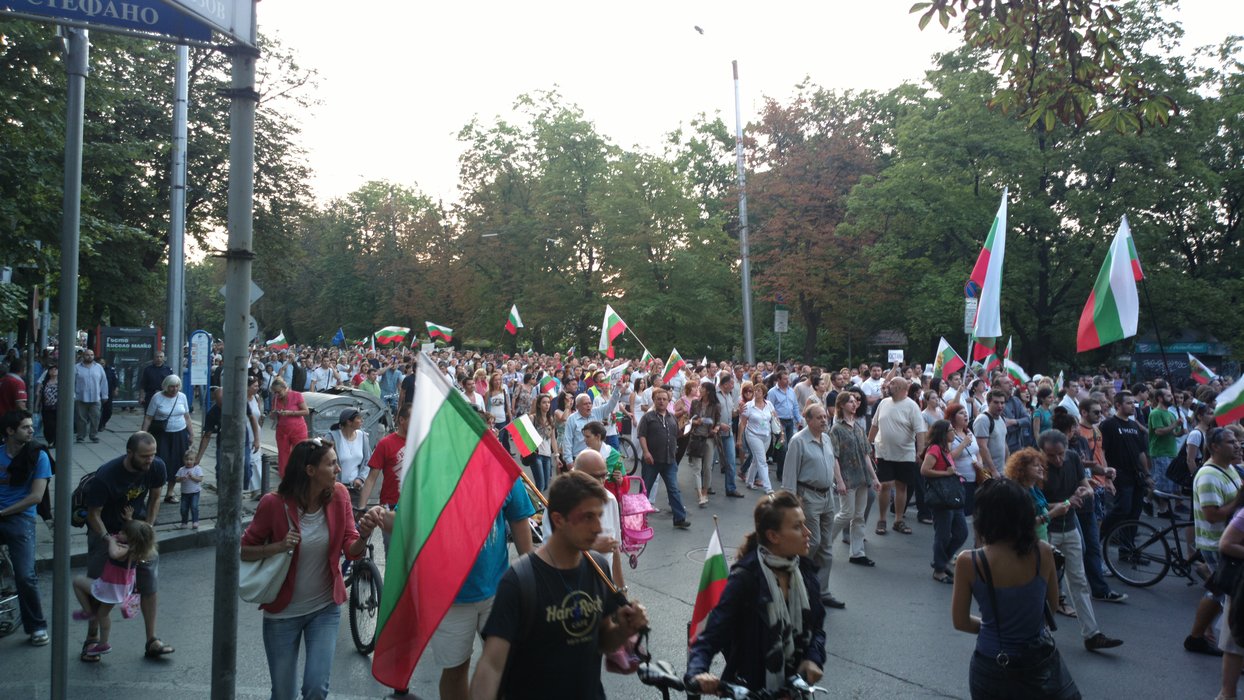
Peaceful Assembly
More protests against COVID-19 restrictions
On 21st October 2021, anti-vaccine protests were held in several cities across the country to demonstrate against Bulgaria's decision to make a COVID-19 "Green Certificate" mandatory for access to institutions and outlets, with only a few exceptions including public transport, banks, pharmacies and food shops. According to the protesters, the restrictions affect their freedoms, and they argued that the vaccination should be voluntary. They called for the interim health minister's resignation, after he made public the new anti-COVID regulations. The protests continued in the following week when thousands of people protested against the authorities' position on the mandatory certificates.
Anti-vaccine protesters in Bulgaria tried to storm Parliament during a rally against COVID restrictions in the capital, but they did not breach the building.
— AJ+ (@ajplus) January 12, 2022
Over 1,000 people gathered in Sofia to protest mask and vaccine mandates. About 28% of people are fully vaccinated. pic.twitter.com/ap81C0hEXH
The protests against COVID-19 measures in Bulgaria continued in January 2022, as protesters expressed displeasure with the new restrictions. Bulgaria continued to be one of the most affected countries by the pandemic, prompting the government to adopt more restrictions to stop the spread of the disease nationally.
On12th January2022, opposition party Vazrazhdane (far-right political party) organised protests against COVID-19 restrictions. According to Reuters, more than 3,000 people attended the rallies to demand the lifting of the mandatory health pass which they said infringed their rights and was forcing them to get vaccinated. Several people were detained by police while attempting to storm the Bulgarian parliament building. After that, the protesters moved to the Council of Ministers and the Ministry of Health building, but were stopped by the police. The press reported injuries among the demonstrators and at least 8 police officers.
Supporting the @BilitisLGBTI protest last night after their Rainbow Hub space was trashed and staff assaulted. Change is needed. No more homophobia, transphobia or fascism in #Bulgaria. pic.twitter.com/53zSASpEt3
— Dr. Hannah Stevens (@Stevens_Han) November 2, 2021
Protesters denounce LGBTQI+ centre attack
A "No to Hate" protest was held in front of the Court Palace in Sofia on 1st November 2021 after an LGBTQI+ centre was attacked, an incident which was later linked to independent presidential candidate Boyan Rassate. The attack on LGBTQI+ community centre Rainbow Hub took place in late October 2021 when a group of around ten people vandalised the place, with witnesses placing the politician at the scene as the leader of the attack.
The attack was condemned by other Bulgarian political actors, who denounced homophobic actions. A joint statement was also signed by ambassadors of several states, condemning the attack.
The Rainbow Hub sent a petition to parliament to demand the criminalisation of hate crimes. 8,000 people signed the petition.
Expression
Authorities acknowledge use of force against journalists
On 30th September 2021, Deputy Prime Minister for Public Order and Security and Minister of InteriorBoyko Rashkov sent a letter to AEJ-Bulgaria and the Anti-Corruption Fund admitting that journalist Dimiter Kenarov had been assaulted by authorities during anti-government rallies in 2020. According to the letter, the journalist was beaten, handcuffed and arrested illegally during the rallies in September 2020. Following these allegations, Rashkov had launched a new internal probe into the case in June 2021, which later revealed violations by officials of the police department, including some senior officials. The matter was then referred to the regional prosecutor’s office for action.
However, according to reports, a senior prosecutor had decided not to investigate the police's actions against the journalist, thus prompting a call for action by AEJ-Bulgaria and the Anti-Corruption Fund.
Two journalists in Bulgaria, Boris Mitov and Stoyana Georgieva, and the site Mediapool were convicted of defamation and ordered to pay the equivalent of some $35,000 for articles reporting the wealth of former court chairman Svetlin Mihailov #journalists #mediafreedom #Bulgaria pic.twitter.com/4Yzq50LMNQ
— BlueprintGreece (@BlueprintGreece) January 10, 2022
Journalists ordered to pay damages for defamation
On 7th January 2022, the Sofia City Court (SCC) found two Bulgarian journalists guilty of defamation and ordered them to pay moral damages of approximately $ 35,000 to Svetlin Mihailov, the former chairman of the SCC. According to the court, in 2018, at the time of Mikhailov’s bid for head of the Sofia City Court, Boris Mitovand Stoyana Georgieva, who were at the time working for the Mediapool news website, caused physical and mental anguish to Mihailov after they published articles about him, including questions about his wealth.
After the journalists' conviction, Radio Free Europe’s President Jamie Fly described the SCC decision as an intimidation of journalistic activities, adding that the public has the right to accurate information and access to public interest data about officials.
Several organisations criticised the court’s judgment and showed solidarity with the journalists. Reporters Without Borders condemned the judicial assault of Bulgarian investigative journalists and called on Bulgaria's government to protect media freedom and not limit their activity by using the Strategic Lawsuits Against Public Participation. The journalists later filed an appeal.
The Bulgarian Parliament adopted the Data Protection Law a few years ago, but the law has been subject to criticism by media experts.